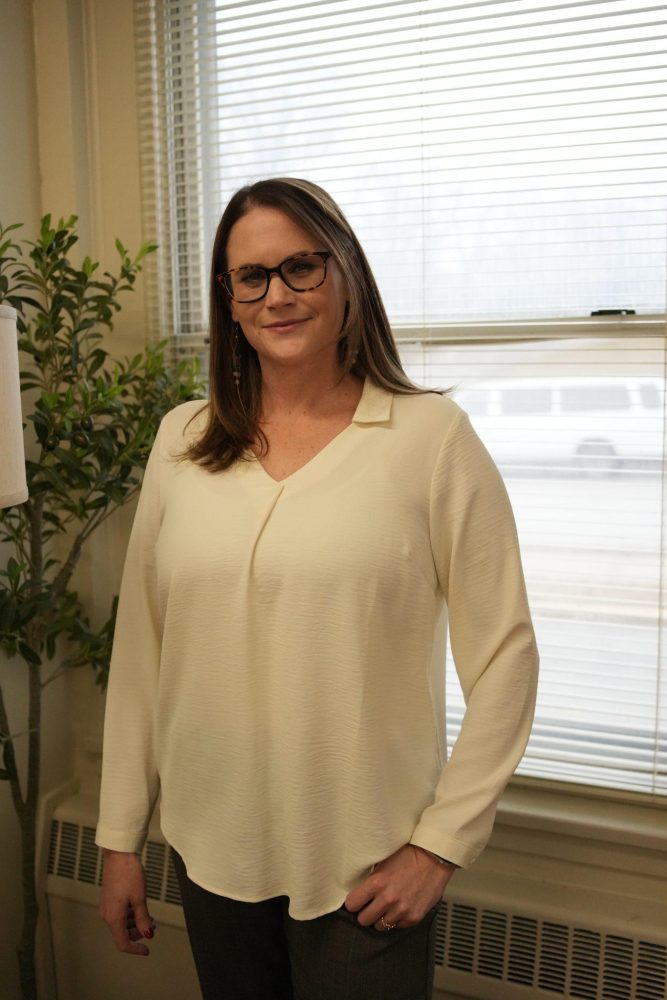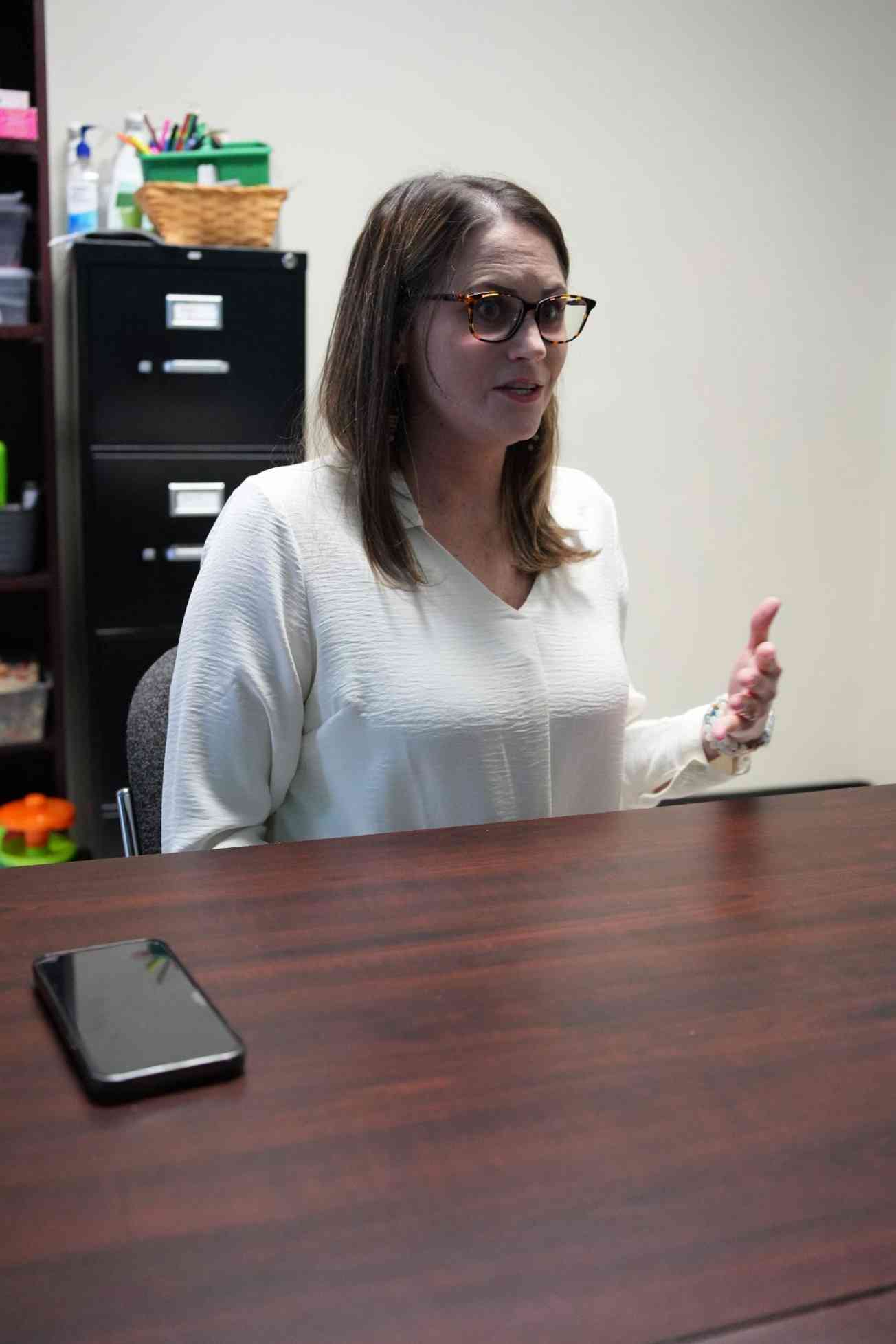Volunteer Commitment and Community Buy-in is the Key to a Refugee’s Success
“Ask us how to help! We will find a place for you. There are so many things people could do for us.”

My name is Claire Peterson. I’m the manager of the health and wellness division at Della Lamb Community Services.
When I first started here, we didn’t have a health team. It was just myself and a driver, Hashmat, taking people around the city making sure that they’re getting to their appointments, etc. Our main goal is to ensure that our clients get their initial Medicaid, but we want to also make sure that they’re comfortable going to the doctor. We want them to know what those steps are so they can really learn how to manage their own care, their children’s care, their elderly parents’ care, etc.
The Harvard Business Review actually did a study on Americans and how their comfort levels are with the health care system. 52% of Americans say that they cannot navigate the healthcare system at all without the assistance of another person. (Source)
And that’s for Americans who speak English. The burdens on our clients are so much higher. Most of my clients can’t read or write in any language. They’ve never received preventative care before. They’ve never gotten the option of prenatal care before. We’re asking them to trust us to get into this system, and not really teaching them anything along the way. So that’s where my team is really trying to step in.
One of the biggest barriers is just getting from their home to the exam room. It’s not just the lack of transportation, especially in the Kansas City Metro. It’s the question of when I walk into this giant, intimidating building, who do I ask for help? How do I find my appointment when it’s on the sixth floor and in some obscure wing of the hospital? So we are teaching them who to recognize in society to go to help, like somebody with a uniform or a badge.
And those are life skills. It really helps them gain confidence to go out and become independent when they learn that there are people in their community who care and do want to help them. That’s one of the first steps for them to go out and feel comfortable getting jobs and becoming invested in our communities.
We have all these restrictions by the federal government and by the state government on what we can use our funding for, and how we’re supposed to do it. And it’s like pounding a square peg into a round hole. There’s a disconnect between what the refugees actually need and what the government thinks is most important for them to get first. We aren’t permitted to incentivize anyone to go to a health education class. I can’t offer child care so that they can learn about birth control or about the importance of dental hygiene for their kids. I can’t get funding for snacks, or tea. I can’t get additional funding for transportation, because it’s all incentivizing them. So when they have four kids under six, and their husbands are working full time and have the only car because they drive themselves and three other refugees to work every day, how is she supposed to come down and take an English class? How is she supposed to be able to enroll her kids in school for the next year? It’s very disconnected. We try to fill that gap.The biggest way that we are able to fill that gap is help from the community.

By far, the clients who get connected with a co sponsor, welcoming group, or an access group are more successful.
I can rest easy knowing that a single mom with six children has a team of 10 people helping them, helping her get her needs, like figuring out how to find grocery stores in her area, or providing African foods that she enjoys that gives her kids that taste of home. That connection is what we need our families to have the most. We need them to know that Kansas City is their forever home now. And if we want them to take care of it and love it and keep our community clean and safe and do well in school, we need to welcome them.
Sometimes we have to kind of break the rules. We have to ask for extra help. I’ve had to rush to people’s houses to try and convince them to go to the ER, and then call a doctor. When I call a doctor, every time they’ll answer. They see my name and answer because they know I’m calling about a refugee. They know that there’s somebody in Kansas City who is brand new and is suffering and that I need their help. They answer no matter what. There’s detectives in Kansas City that if we need help, if we’ve got a client that we’re worried about their safety, we call them and they can sometimes get there faster than 911. We know that they’re going to understand the context of the situation. We have our entire Kansas City community that we can call on and they show up. It’s amazing.
There's so many little things that people could do that would be incredible for us.
Like if they could bring us bikes that they ordered off of Amazon that they assembled so that we don’t have to assemble them. That would save us some physical labor that we don’t have time to do. Someone could come and take car seats out of the box and put them together so when we have a family arrive, we can grab the car seat and go. We always need baby bags. Clay County Health Department stepped up and did a fundraiser for us and made baby bags that were wildly popular. We had a pretty new bag to give to a pregnant woman that has the essentials. These are easy simple things that can help a lot.
Having a community involved is key to giving refugees tools to be able to empower themselves, giving them pathways to success, giving them hope that they can succeed here. If they don’t feel like that, then they’ll become angry, they’ll become bitter, they’ll reject what we give them. They will trash our streets. And that is something that is important to all of us. We need to show them that there’s hope again, and that they can invest in the future.
I think that it’s really important for people to understand that the people that we serve are here.
This is no longer a bipartisan issue. Once they arrive, it’s a people issue.
This isn’t a debate over whether or not we agree about the southern border or who’s in office or immigration policy. They’re here now and they are part of our community. This is our family. Their children are the same children that are standing at the bus stop with your kids. They’re the same children that are going to be playing sports with your kids. They’re going to influence your kids and your kids are going to influence them. How do you want that to be?
These kids want to be on the soccer team. They want to play baseball. They want to just be kids! A big problem with refugees is that they don’t have anything to do. I worked with a woman who it really it’s a miracle that she survived her pregnancy. It necessitated that she stayed on bedrest for three weeks. Now it’s one thing for an American woman to be on bed rest for three weeks. An American might have a phone you could use to call whoever, or have the internet to look up videos, or find entertainment. You could read a book, knit or crochet, or whatever your hobby is. Here in America, none of my clients have hobbies.
This poor woman came from a very rural area of Afghanistan. She had a two year old daughter. Her husband had just gotten a job so he was finally able to send money to help her younger brother, who was fleeing from the Taliban. She had no family here to help her watch the kids. It was impossible for us to get the kid into a daycare. They had no benefits. So for three weeks, that’s all that she had to dwell on: we’re gonna get evicted, we’re going to lose our home, my brother is not going to be able to find safety, who’s going to watch my daughter. All of this was going through her head and she wanted to leave the hospital. It took all of us to try and convince her to stay. We guaranteed that we would pay for their rent. Did we have the funds? No, but we found them somehow. We got them donated, we begged for help, but we got their rent paid for three more months, along with their utilities. We did everything that we could to support them to keep her there and she did end up deciding to stay. And three weeks later, her baby was born via C-section and was the healthiest baby in the NICU–only on oxygen and observation. We all went through that crisis. That really helped us build relationships with University Health. Through all of that we became very, very close. Now we have a great relationship with them and we take our women on tours. All of that was founded and started by this one baby. I got to see him a few months ago for the first time since he was in the NICU and I just thought, Oh my gosh, you changed Kansas City for refugees. And you don’t even know.
When we have volunteers that are going to be working closely with a family, they’re so nervous. They’re so worried that they’re going to offend a refugee. One of the first things that I tried to tell them is that the refugees are going to be feeling the exact same way. They’re gonna be worried that they’re going to be offending you! There’s probably going to be a miscommunication at some point, but you’ve been through those with your own family before. It’s not that big of a deal. You get through them. It’s okay.
The best part of the job is making people fall in love with America, and making them fall in love with Kansas City. It’s not hard to do. We just need a little bit of relief that we can get from people, a little bit of grace from the community. That’s all that we need. And come ask us how to help! We will find a place for you.
Our team members obtain informed consent from each individual before an interview takes place. Individuals dictate where their stories may be shared and what personal information they wish to keep private. In situations where the individual is at risk and/or wishes to remain anonymous, alias names are used and other identifying information is removed from interviews immediately after they are received by TSOS. We have also committed not to use refugee images or stories for fundraising purposes without explicit permission. Our top priority is to protect and honor the wishes of our interview subjects.